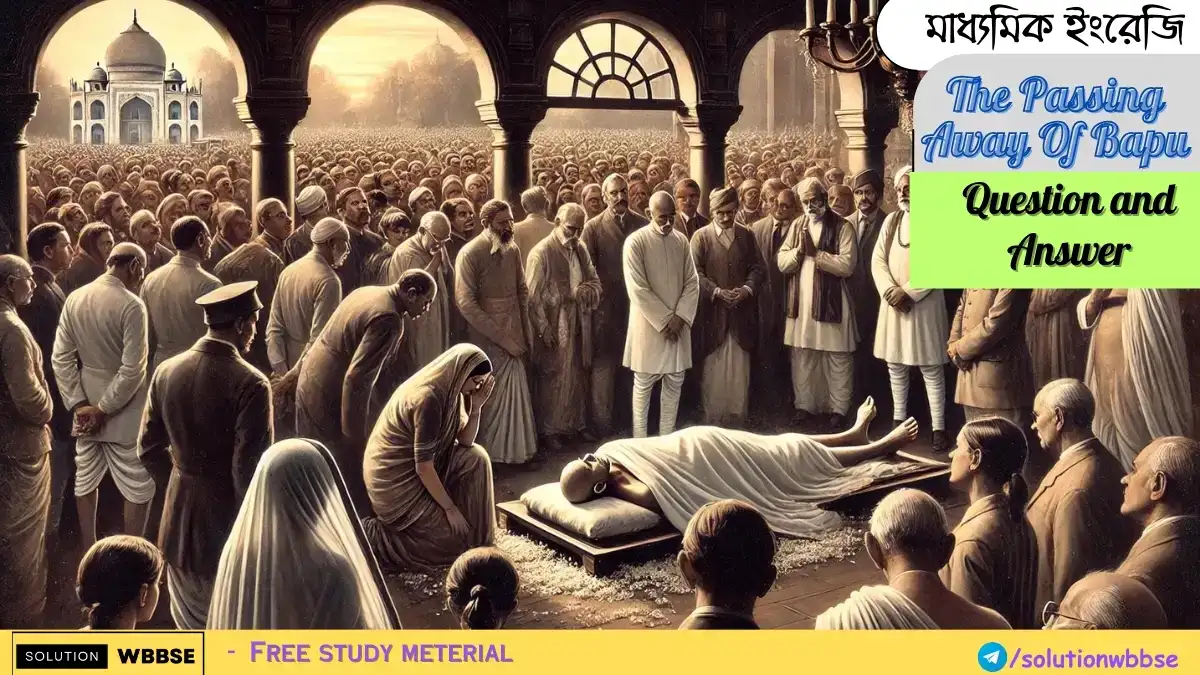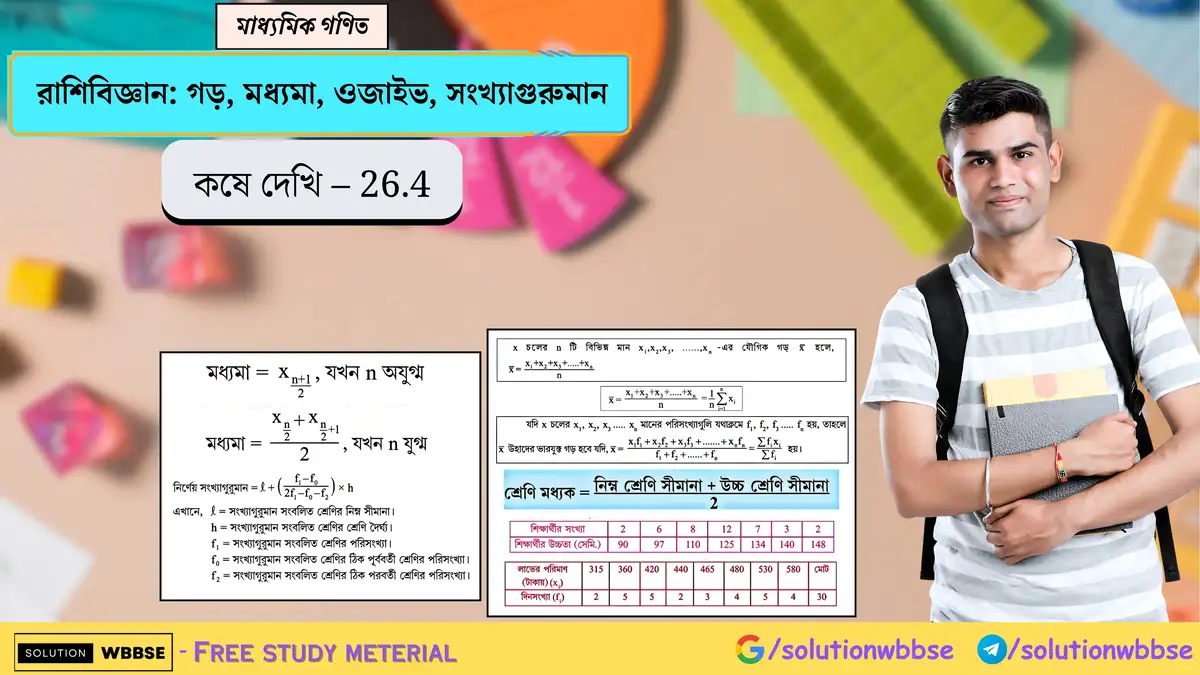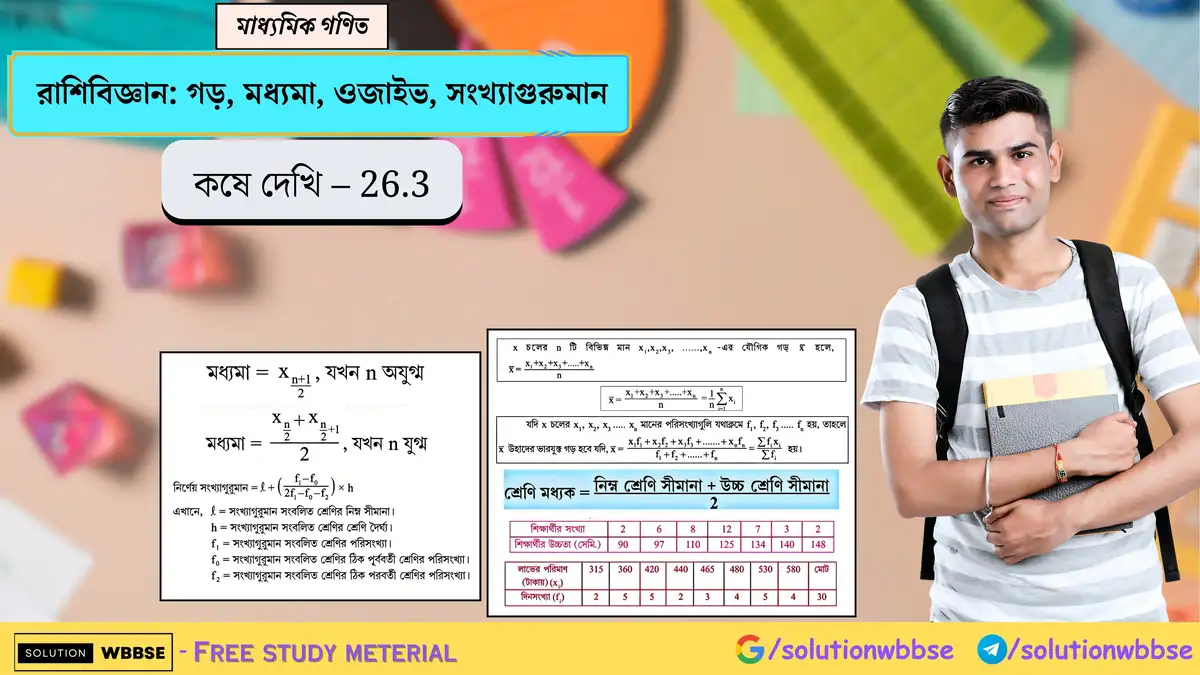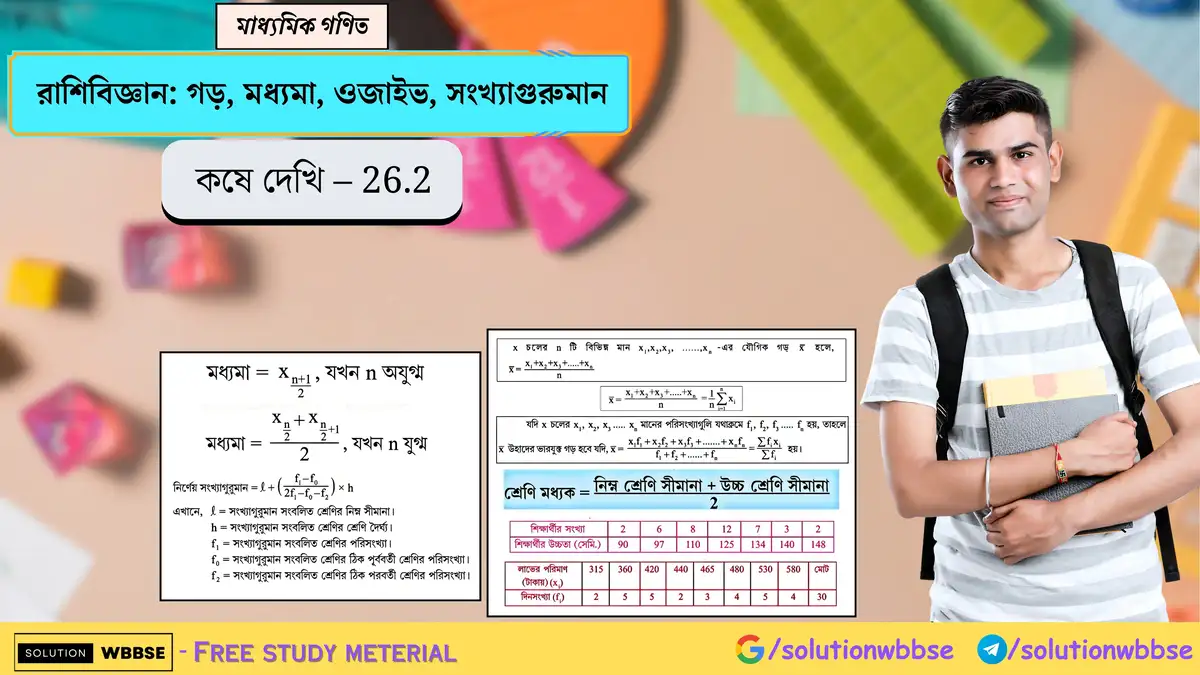আজকের আর্টিকেলে আমরা মাধ্যমিক ইংরেজির তৃতীয় অধ্যায় “The Passing Away of Bapu” এর কিছু অতিসংক্ষিপ্ত প্রশ্ন-উত্তর নিয়ে আলোচনা করবো। এই প্রশ্নগুলো মাধ্যমিক পরীক্ষার প্রস্তুতির জন্য অত্যন্ত গুরুত্বপূর্ণ। কারণ, এই প্রশ্নগুলো মাধ্যমিক পরীক্ষায় প্রায়ই দেখা যায়। আশা করি, এই আর্টিকেলটি আপনাদের জন্য উপকারী হবে।

UNIT 1
Choose the correct alternative to complete the following sentences
1. Gandhiji had been shot on his way to
- the Birla House
- the author’s house
- a prayer meeting
- a family gathering
Answer – 3. a prayer meeting
- a letter
- a telephone call
- a telegram
- a public broadcast
Answer – 2. a telephone call
3. When one is faced with the shock of a loved one’s death, one
- whimpers
- laughs
- claps
- shouts
Answer – 1. whimpers
Fill in the chart with information from the text –
| 1. date on which Gandhiji was shot dead | |
| 2. place where Gandhiji breathed his last | |
| 3. information given by the broadcast |
Answer –
| 1. date on which Gandhiji was shot dead | 30th January, 1948 |
| 2. place where Gandhiji breathed his last | Birla House |
| 3. information given by the broadcast | Bapu was no more. |
State whether the following statements are True or False. Provide sentences/phrases/words in support of your answer:
Answer – False
Supporting statement – I was having tea at home on the evening of 30th January, 1948, when I was called to Birla house by an urgent telephone.
2. People attempted to break into the Birla House.
Supporting statement – _____________
Answer – True
Supporting statement – They jostled one another in a stampede to break into the house.
(c) The news of Gandhiji’s death did not shock the people.
Supporting statement – _____________
Answer – False
Supporting statement – The people were too stunned to speak in the beginning.
UNIT 2
Choose the correct alternative to complete the following sentences
Gandhiji’s funeral was to take place
- on the day of his death
- two days after his death
- one day after his death
- a week after his death
Answer – 3. one day after his death
Padmasi was Mrs. Naidu’s
- niece
- sister
- friend
- daughter
Answer – 4. daughter
While walking, Bapu used to carry in his hand a/an
- flag
- staff
- umbrella
- cane
Answer – 2. staff
Complete the following sentences with information from the text
Thousands of people wept, trying ______________________
Answer – Thousands of people wept, trying to touch Bapu’s feet.
Answer – The author was among people for whom walking with Bapu had a special meaning.
To walk is to ______________________
Answer – To walk is to make slow progress.
6. Fill in the chart with information from the text:
| Statement | Reason |
| It was impossible to move. | |
| Padmasi declared that they would walk with Gandhiji in the funeral procession. | |
| To walk was often the only way open to the average Indian. |
Answer –
| Statement | Reason |
| It was impossible to move. | There was a thick crowd. |
| Padmasi declared that they would walk with Gandhiji in the funeral procession. | It was the last time they would be walking with Bapu. |
| To walk was often the only way open to the average Indian. | It required no vehicle except his own body and cost him nothing but his energy. |
Choose the correct alternative to complete the following sentences
Gandhiji’s ashes were taken to
- Ahmedabad
- Allahabad
- Delhi
- Benaras
Answer – 2. Allahabad
A huge crowd had gathered by the
- Ganges
- Yamuna
- Brahmaputra
- Narmada
Answer – 1. Ganges
Gandhiji awakened people to one another’s
- indifference
- jealousy
- suffering
- greed
Answer – 3. suffering
Complete the following sentences with information from the text
People on the special train ____________.
Answer – People on the special train sang bhajans.
The author felt she had grown up within ____________.
Answer – The author felt she had grown up within a magic circle.
Bapu had passed away but ____________.
Answer – Bapu had passed away but his India would continue to live in his children.
Fill in the chart with information from the text:
| Cause | Effect |
| People did not weep anymore. | |
| The magic circle vanished. | |
| The author felt that she wouldn’t lose courage so easily. |
Answer –
| Cause | Effect |
| People could feel Gandhiji’s presence amid the flowers and the songs. | People did not weep anymore. |
| The magic circle vanished. | The author felt unprotected. |
| The author’s values were not so weak. | The author felt that she wouldn’t lose courage so easily. |
Grammar in use
Join the following pairs of sentences into single sentences as directed
1. I saw a snake. I ran away.(use participle)
Answer – Seeing a snake, I ran away.
2. He learns music. He listens to the chords. (use preposition with gerund)
Answer – By listening to the chords, he learns music.
3. Gold is a precious metal. It is used to make ornaments. (use noun in apposition)
Answer – Gold, a precious metal, is used to make ornaments.
4. Ramu has some money. He can buy books. (use infinitive)
Answer – Ramu has some money to buy books.
5. The sky was cloudy. We postponed our journey. (use nominative absolute)
Answer – The sky being cloudy, we postponed our journey.
6. The boy wrote the answer. The answer was incorrect. (use adverbial phrase)
Answer – The boy wrote the answer in an incorrect way.
Join the following pairs of sentences into single compound sentences as directed
1. The old man is unwell. He cannot go out. (use Illative conjunction)
Answer – The old man is unwell. So he cannot go out.
2. He is honest. He is humble. (use cumulative conjunction)
Answer – He is not only honest but also humble.
3. Sonali cannot write poetry. She keeps on trying. (use adversative conjunction)
Answer – Sonali cannot write poetry but she keeps on trying.
4. Study hard. You will not pass the examination. (use alternative conjunction)
Answer – Study hard or you will not pass the examination.
Join the following pairs of sentences into single complex sentences as directed
1. Rabindranath Tagore is a famous poet. He won the Nobel Prize. (use adjective clause)
Answer – Rabindranath Tagore, who is a famous poet, won the Nobel Prize.
2. He returned home. Everyone in the family had fallen asleep. (use adverb clause)
Answer – When he returned home, Everyone in the family had fallen asleep.
3. The sun rises in the east. Everyone knows it. (use noun clause)
Answer – Everyone knows that the sun rises in the east.
13. Join the following pairs of sentences into single sentences as directed
1. It rained hard. The roads were not flooded. (compound sentence)
Answer – It rained hard but the roads were not flooded.
2. He completed his work. He took rest. (simple sentence)
Answer – On completing his work, He took rest.
3. Rahul is a great singer. He can sing different kinds of songs. (complex sentence)
Answer – Rahul, who is a great singer, can sing different kinds of songs.
4. The time of departure of the train has changed. Alia knew it. (complex sentence)
Answer – Alia knew that the time of departure of the train had changed.
5. I do not watch television. I do not listen to the radio. (compound sentence)
Answer – I neither watch television nor do not listen to the radio.
6. The child was short. The child could not pick the guava from the tree. (simple sentence)
Answer – Being short, the child could not pick the guava from the tree.
14. Split the following into two sentences
1. It rained and I could not leave my room.
Answer – It rained. I could not leave my room.
2. He thought that he could win the race.
Answer – He could win the race. He thought it.
3. Having been informed of the trouble, the Principal left for home.
Answer – The principal had been informed of the trouble. He left for home.
4. Nasir, who was the captain of the team, scored a century.
Answer – Nasir was the captain of the team. He scored a century.
Write a biography of Maulana Abul Kalam Azad (within 100 words) based on the hints given below
born on 11 November 1888-composed poetry in Urdu-worked as a journalist, protested against British Raj-enthusiastic supporter of Gandhiji’s ideas-wrote many books-like ‘India wins freedom’, ‘Ghubar-e-Khatir’ etc.first Education Minister of independent India-birthday celebrated as National Education Day-died on 22 February 1958
Maulana Abul Kalam Azad
Maulana Abul Kalam Azad was born on 11 November 1888. A scholar and poet, he composed Urdu poetry and worked as a journalist, actively protesting against British rule. A strong supporter of Mahatma Gandhi’s ideas, he played a key role in India’s freedom movement. Azad authored several books, including India Wins Freedom and Ghubar-e-Khatir. After independence, he became India’s first Education Minister, laying the foundation for the country’s education system. In his honor, his birthday is celebrated as National Education Day. He passed away on 22 February 1958, leaving behind a lasting legacy in India’s intellectual and political history.
Use the following flow-chart to write a paragraph (within 100 words) on how a building is constructed
drawing of a plan of the building by the architect-getting the plan sanctioned by the corporation or municipal authorities-engaging masons and labourers-starting the construction with bricks, cement and sand-fitting doors and windows-plastering of walls-wiring-electric and water connections-painting-building completed-fit for living
How a Building Is Made
When a building is to be constructed, we have to follow a long process. First, a plan is drawn by an architect and then sanctioned by the corporation or municipal authorities. After approval, masons and laborers are engaged. The construction starts with bricks, cement, and sand. As the work progresses, doors and windows are fitted. Once the structure is complete, the walls are plastered. Then, electric wiring is done, followed by electric and water connections. Finally, the walls are painted both inside and outside. Now, the building is complete and ready for living.
What was the condition of the narrator after getting the telephone call? [টেলিফোন বার্তাটি পাওয়ার পর কথকের অবস্থা কেমন ছিল?]
The telephone call made Nayantara Sahgal numb with shock. [টেলিফোন বার্তাটি নয়নতারা সেহগলকে আকস্মিক আঘাতে বিবশ করে দিয়েছিল।]
What broadcast did the common people listen to? [রেডিওবার্তায় সাধারণ মানুষ কী শুনেছিল?]
The common people heard that their Bapu was no more. [সাধারণ মানুষ শুনেছিল যে তাদের বাপু আর নেই।]
Where was Gandhiji when he was shot? [গান্ধিজি কোথায় ছিলেন যখন তাঁকে গুলি করা হয়?]
Gandhiji was on his way to the prayer meeting when he was shot. [গান্ধিজি প্রার্থনা সভায় যোগ দিতে যাচ্ছিলেন যখন তাঁকে গুলি করা হয়।]
The authoress got the news through an urgent telephone call. [এক জরুরি টেলিফোন বার্তায় লেখিকা সংবাদটি পেয়েছিলেন।]
What happened on 30th January, 1948? [১৯৪৮ সালের ৩০শে জানুয়ারি কী ঘটেছিল?]
On 30th January, 1948, Nayantara Sahgal was having tea at home in the evening. She was called to Birla House by an urgent telephone call. Gandhiji had been shot on his way to the prayer meeting. [১৯৪৮ সালের ৩০শে জানুয়ারি, সন্ধ্যাবেলায় নয়নতারা সেহগল নিজের বাড়িতে বসে চা পান করছিলেন। জরুরি টেলিফোন বার্তায় তাঁকে বিড়লা হাউসে ডেকে পাঠানো হলো। প্রার্থনা সভায় যাওয়ার পথে গান্ধিজিকে গুলি করা হয়েছে।]
What did the narrator find upon reaching the Birla House? [বিড়লা হাউসে পৌঁছে কথক কী দেখলেন?]
Upon reaching the Birla House, the narrator found that Gandhiji’s relatives and followers had gathered around his body. There was silence in the room as Gandhiji breathed his last. [বিড়লা হাউসে পৌঁছে কথক দেখলেন যে গান্ধিজির আত্মীয়স্বজন ও অনুগামীরা তাঁর মৃতদেহকে ঘিরে জড়ো হয়েছেন। যেহেতু গান্ধিজি শেষ নিঃশ্বাস ত্যাগ করেছেন, তাই ঘরের মধ্যে এক নিস্তব্ধতা বিরাজ করছিল।]
How did the people react to the news of Gandhiji’s death? [গান্ধিজির মৃত্যুসংবাদে সাধারণ মানুষ কীভাবে প্রতিক্রিয়া ব্যক্ত করেছিল?]
The news of Gandhiji’s death spread through Delhi like a flame fanned by the wind. Sad groups of men and women collected around the Birla House. [গান্ধিজির মৃত্যুসংবাদ সারা দিল্লিতে আগুনের মতো ছড়িয়ে পড়ল। দুঃখিত পুরুষ-মহিলা দলে দলে বিড়লা হাউসের চারপাশে জড়ো হতে লাগলেন।]
Why is the prevailing silence described as ‘unnatural’? [বিরাজমান নিস্তব্ধতাকে ‘অস্বাভাবিক’ বলে বর্ণনা করা হয়েছে কেন?]
Bapu’s death was absolutely unexpected. So the people were too stunned to express their sorrow. It seemed time stood still for a few minutes. So the prevailing silence was quite ‘unnatural’. [বাপুর মৃত্যু একেবারে অপ্রত্যাশিত ছিল। তাই লোকেরা এত হতভম্ব হয়ে গিয়েছিল যে তারা নিজেদের দুঃখ প্রকাশ করতে পারেনি। মনে হয়েছিল যেন সময় কয়েক মিনিটের জন্য থমকে দাঁড়িয়ে পড়েছে। তাই বিরাজমান নীরবতা একেবারে ‘অস্বাভাবিক’ ছিল।]
What was the people’s reaction later? [পরে মানুষের প্রতিক্রিয়া কেমন ছিল?]
Later, people clamored wildly, shouting and crying. They jostled one another in a stampede to break into the house to see Gandhiji, their beloved leader, for the last time. [পরে মানুষ পাগলের মতো হৈ চৈ করতে লাগল, চিৎকার করতে লাগল, কাঁদতে লাগল। গান্ধিজিকে দেখার জন্য ঘরে ঢোকার হুড়োহুড়িতে পদপিষ্ট হওয়ার মতো পরিস্থিতি তৈরি হলো, কারণ তারা তাদের প্রিয় নেতাকে শেষবারের মতো দেখতে চায়।]
What was the uppermost question in the minds of the mourning people? [বিলাপ করা জনতার মনের সবচেয়ে বড়ো প্রশ্ন কী ছিল?]
What would become of the mourning people as Gandhiji had left them forever? This was the uppermost question in their minds. [গান্ধিজি তাঁদের চিরকালের জন্য ছেড়ে চলে যাওয়ায় বিলাপরত জনতার কী হবে? এটাই তাদের মনে সবচেয়ে বড়ো প্রশ্ন ছিল।]
Why did the people look like ‘lost children’? [সাধারণ মানুষকে ‘হারিয়ে যাওয়া শিশু’র মতো দেখাচ্ছিল কেন?]
To the common people of India, Gandhiji was Bapu, their father. After their Bapu’s death, they felt uncertainty, not knowing where to go and what to do. Hence they were like ‘lost children’. [ভারতের সাধারণ মানুষের কাছে গান্ধিজি ছিলেন বাপু, তাদের পিতা। বাপুর মৃত্যুর পর তারা অনিশ্চয়তা অনুভব করছিল, তারা জানত না কোথায় যাবে আর কী করবে। তাই তারা ‘হারিয়ে যাওয়া শিশু’।]
Who was Padmasi? [পদ্মশী কে ছিলেন?]
Padmasi was Mrs. Naidu’s daughter. [পদ্মশী ছিলেন শ্রীমতী নাইডুর মেয়ে।]
Why was it impossible to move? [এগোনো অসম্ভব কেন ছিল?]
It was impossible to move due to the thick crowd. [এগোনো অসম্ভব ছিল প্রচুর লোকের ভিড়ের জন্য।]
What did the narrator understand while walking? [হাঁটার সময় কথক কী বুঝেছিলেন?]
She was not merely in the midst of grieving people. [তিনি কেবল যন্ত্রণাকাতর মানুষজনের মধ্যেই ছিলেন না।]
What couldn’t the narrator accept? [কথক কী মানতে পারেননি?]
The narrator couldn’t accept Bapu’s absence forever. [বাপুর চিরস্থায়ী অনুপস্থিতি কথক কিছুতেই মানতে পারেননি।]
What was the only way open to the average Indian? [গড়পড়তা ভারতীয়দের জন্য একমাত্র কোন্ রাস্তা খোলা ছিল?]
To walk was the only way open to the average Indian. [গড়পড়তা ভারতীয়দের জন্য একমাত্র খোলা রাস্তা ছিল হাঁটা।]
What happened on the day of Gandhiji’s funeral? [গান্ধিজির শেষকৃত্যের দিন কী ঘটেছিল?]
On the day of Gandhiji’s funeral, people lined the route the funeral procession was to follow hours in advance. All the followers of Gandhiji walked with their Bapu for the last time. [গান্ধিজির শেষকৃত্যের দিন কয়েক ঘণ্টা আগে থেকেই যে রাস্তা দিয়ে তাঁর শেষযাত্রা যাবে তার দুপাশে সারিবদ্ধভাবে মানুষ দাঁড়িয়েছিলেন। গান্ধিজির অনুগামীরা তাঁদের বাপুর সঙ্গে শেষবার হেঁটেছিলেন।]
How was Gandhiji’s funeral procession? [গান্ধিজির শেষকৃত্যের শোভাযাত্রা কেমন ছিল?]
Gandhiji’s followers walked an agonizing walk in the funeral procession. Bapu lay on an open truck covered with flowers. Thousands silently watched the procession while others wept, trying to touch Bapu’s feet. [গান্ধিজির অনুগামীরা শেষকৃত্যের শোভাযাত্রায় এক যন্ত্রণাদায়ক পথ হেঁটেছিলেন। এক খোলা ট্রাকে ফুলে ঢাকা অবস্থায় বাপু শায়িত ছিলেন। হাজার হাজার মানুষ নিঃশব্দে শোভাযাত্রা চাক্ষুষ করছিলেন, অন্যরা কাঁদছিলেন এবং বাপুর পা স্পর্শ করার চেষ্টা করছিলেন।]
How special was the walk with the funeral procession, as described by the narrator? [যেভাবে কথক বর্ণনা করেছেন, শেষকৃত্যের শোভাযাত্রায় হাঁটা কোন্ দিক থেকে বিশেষ ধরনের ছিল?]
As described by the narrator, while walking with the funeral procession of Bapu, she experienced that she was not merely in the midst of grieving people. She found that walking with Bapu had a special meaning. [যেভাবে কথক বর্ণনা করেছেন যে বাপুর শেষকৃত্যের শোভাযাত্রায় হাঁটতে গিয়ে তিনি উপলব্ধি করেন যে, তিনি কেবলমাত্র একদল যন্ত্রণাক্লিষ্ট মানুষের মধ্যে নেই। বাপুর সাথে হাঁটার মধ্যে তিনি এক বিশেষ অর্থ খুঁজে পেয়েছিলেন।]
What was Bapu’s view about walking? [হাঁটার ব্যাপারে বাপুর দৃষ্টিভঙ্গি কী ছিল?]
According to Bapu’s opinion, to walk is to make slow progress. It gives scope to think with clarity and look closely at everything around the person. [বাপুর মত অনুসারে, হাঁটার অর্থ হলো ধীর অগ্রগতি। এটা ব্যক্তির চারপাশের সমস্ত জিনিসকে স্বচ্ছতার সঙ্গে এবং কাছ থেকে দেখার সুযোগ করে দেয়।]
How was walking for the average Indian? [সাধারণ ভারতীয়দের কাছে হাঁটার কী অর্থ ছিল?]
For the average Indian, to walk was often the only way open. It required no vehicle except his own body and cost him nothing but his energy. [সাধারণ ভারতীয়দের কাছে, প্রায়শই হাঁটাই ছিল একমাত্র খোলা রাস্তা। হাঁটতে গেলে কোনো বাহন লাগে না, কেবল নিজের দেহ আর শক্তি ছাড়া অন্য খরচও লাগে না।]
Why didn’t people weep anymore? [লোকে আর কেন কাঁদছিল না?]
It was because they could feel Gandhiji’s presence there. [এর কারণ তারা সেখানে গান্ধিজির উপস্থিতি অনুভব করতে পারছিল।]
What did Bapu do for millions of people? [বাপু লক্ষ লক্ষ মানুষের জন্য কী করেছিলেন?]
Bapu brought millions of people out of indifference and made them united. [বাপু লক্ষ লক্ষ মানুষকে তাদের ঔদাসীন্য থেকে বের করে এনেছিলেন এবং তাদেরকে ঐক্যবদ্ধ করেছিলেন।]
How did the narrator feel when she was back in Delhi? [দিল্লিতে ফিরে এসে কথকের কেমন অনুভূতি হয়েছিল?]
Back in Delhi, the narrator felt at a loss. [দিল্লিতে ফিরে এসে কথক দিশাহারা হয়ে পড়েছিলেন।]
Here, ‘magic circle’ means the great living influence of Gandhiji. [এখানে ‘জাদুবৃত্ত’ বলতে বোঝায় গান্ধিজির মহান প্রাণবন্ত প্রভাব।]
How did the magic circle vanish? [জাদুবৃত্ত কীভাবে উবে গিয়েছিল?]
The magic circle vanished with the passing away of Bapu. [বাপুর মৃত্যুর সঙ্গে সঙ্গে জাদুবৃত্ত উবে গিয়েছিল।]
How would India continue to live after the passing away of Bapu? [বাপু মারা যাওয়ার পরে কীভাবে ভারত বেঁচে থাকবে?]
India would continue to live in Bapu’s children. [ভারত বেঁচে থাকবে বাপুর সন্তানদের মাঝে।]
How was the special train carrying Gandhiji’s ashes? [গান্ধিজির চিতাভস্ম বহনকারী বিশেষ ট্রেনটি কেমন ছিল?]
A special train took Gandhiji’s ashes to Allahabad. The compartment was decked with flowers. People on the train sang bhajans. Amid song and prayer, the train reached Allahabad. [একটি বিশেষ ট্রেনে গান্ধিজির চিতাভস্ম এলাহাবাদে নিয়ে যাওয়া হয়েছিল। কামরাটি ফুল দিয়ে সজ্জিত ছিল। ট্রেনের মধ্যে লোক ভজন গাইছিল। গান ও প্রার্থনার মাঝে ট্রেনটি এলাহাবাদ পৌঁছেছিল।]
How was the common people’s reaction when the special train took Gandhiji’s ashes to Allahabad? [বিশেষ ট্রেনে যখন গান্ধিজির চিতাভস্ম এলাহাবাদে নিয়ে যাওয়া হচ্ছিল তখন সাধারণ মানুষের প্রতিক্রিয়া কীরকম ছিল?]
People on the train sang bhajans. They did not weep anymore for they could feel Gandhiji’s presence amid flowers and songs. At every station, sorrowful crowds filled the platform. [সাধারণ মানুষ ট্রেনের মধ্যে ভজন গাইছিল। তারা আর কাঁদছিল না কারণ তারা গান্ধিজির উপস্থিতি ফুল ও গানের মাঝে অনুভব করছিল। প্রত্যেক স্টেশনের প্ল্যাটফর্ম দুঃখী মানুষের ভিড়ে ঠাসা ছিল।]
What was the narrator’s assessment about herself and Gandhiji after coming back to Delhi from Allahabad? [এলাহাবাদ থেকে দিল্লি ফিরে কথকের নিজের সম্পর্কে এবং গান্ধিজি সম্পর্কে মূল্যায়ন কী ছিল?]
Though the narrator was never directly associated with Gandhiji’s work, she felt at sea. But now she could understand that she and others grew up within a magic circle. With Bapu’s passing away, that very magic circle had vanished, leaving them unprotected. [যদিও কথক কখনোই গান্ধিজির কর্মকাণ্ডের সঙ্গে সরাসরি যুক্ত ছিলেন না, তবুও তিনি একরকম দিশাহারা অনুভব করলেন। কিন্তু তিনি এখন উপলব্ধি করতে পারলেন যে তিনি এবং অন্যরা এক জাদুবৃত্তের মধ্যে বেড়ে উঠেছেন। বাপুর চলে যাওয়ার সঙ্গে সঙ্গেই, সেই জাদুবৃত্ত উধাও হয়ে গেছে, তাদের ফেলে রেখে গেছে অরক্ষিত অবস্থায়।]
What was the narrator’s view about her own values? [নিজের মূল্যবোধ সম্পর্কে কথকের দৃষ্টিভঙ্গি কী ছিল?]
According to the narrator’s assessment, her own values were not so weak. She had enough courage to carry on moving forward even in the absence of Bapu. [কথকের মূল্যায়ন অনুসারে, তার নিজের মূল্যবোধগুলি অত দুর্বল ছিল না। তার মধ্যে যথেষ্ট সাহস ছিল, বাপুর অনুপস্থিতিতেও সম্মুখ যাত্রা চালিয়ে যাওয়ার জন্য।]
What was the narrator’s resolution after Gandhiji’s death? [গান্ধিজির মৃত্যুর পরে কথকের প্রতিজ্ঞা কী ছিল?]
Gandhiji’s death was a great loss. But the narrator and others were still young, strong, and proud enough to bear Gandhiji’s banner before them. [গান্ধিজির মৃত্যু ছিল এক বিশাল ক্ষতি। কিন্তু কথক ও অন্যরা তাঁদের সামনে গান্ধিজির পতাকা বহন করার জন্য যথেষ্ট অল্পবয়সি, শক্তসমর্থ এবং গর্বিত ছিলেন।]
আজকের আর্টিকেলে আমরা মাধ্যমিক ইংরেজির তৃতীয় অধ্যায় “The Passing Away of Bapu” এর কিছু অতিসংক্ষিপ্ত প্রশ্ন-উত্তর নিয়ে আলোচনা করেছি। এই প্রশ্নগুলো মাধ্যমিক পরীক্ষার জন্য অত্যন্ত গুরুত্বপূর্ণ, কারণ এগুলো মাধ্যমিক পরীক্ষায় প্রায়ই দেখা যায়। আশা করি, এই আর্টিকেলটি আপনাদের জন্য উপকারী হয়েছে। আপনারা যদি কোনো প্রশ্ন বা অসুবিধার সম্মুখীন হন, তাহলে টেলিগ্রামে আমার সঙ্গে যোগাযোগ করতে পারেন, আমি উত্তর দেওয়ার চেষ্টা করবো। এছাড়া, নিচে এই পোস্টটি আপনার প্রিয়জনদের সঙ্গে শেয়ার করুন, যাদের এটির প্রয়োজন হতে পারে। ধন্যবাদ।






মন্তব্য করুন